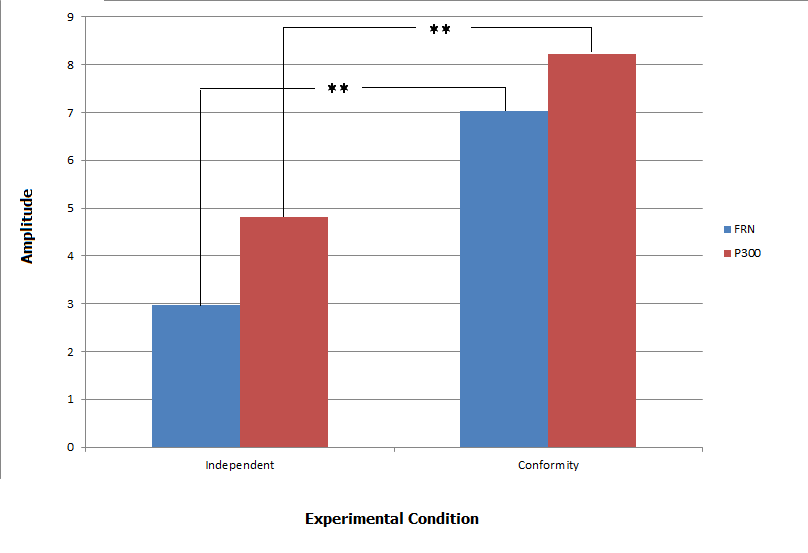The WAGER, Vol. 18(7) – Gambling, groupthink, and emotional security blankets
Generally
speaking, people tend to follow others’ behavior to avoid conflict (Cialdini
& Goldstein, 2004). In addition to helping us avoid conflict, social
conformity may help us deal with negative emotions when things go awry (Berns
et al., 2011). Is it true for gambling losses? This week’s WAGER reviews an
experiment that examined whether social conformity acts as an emotional buffer
in response to bad outcomes from gambling (Yu & Sun, 2013).
Methods
- The researchers
paired 21 participants (10 male, mean age = 20.23 years) with two other people
in a group gambling task. Unbeknownst to the subjects, these two people were
experiment-related confederates. - The task
required participants to choose one of two options for a chance to win a cash
prize.- Participants
were not told, but the actual chance of winning was always 50%.
- Participants
- After making a
choice, participants were informed about whether they won or lost, and the confederates’
choices.- The
participant might win alone, lose alone, win with others, or lose
with others.
- The
- During the
gambling task, the researchers used an electroencephalogram (EEG) to measure
subjects’ brain response to the specific events of the task.- EEG
measurements were for two types of brain activity related to monitoring
negative outcomes and rewards. [1]
- EEG
Results
- Across all
trials, participants’ choices tended to mirror that of the confederates, even
though this strategy did not produce more wins. This suggests that they conformed
to a social norm, even though it did not lead to more monetary rewards. - When
participants either won alone or lost alone, they tended to show more negative deflection
in one of the measures of brain activity, suggesting increased conflict
detection and stress response. See Figure 1. - The EEG activity
suggested that participants were less sensitive to monetary outcomes during
conforming choices (i.e., win with others and lose with others); compared to non-conforming
choices (i.e., win alone and lose alone).
Figure 1: Averaged waveform amplitudes between
conforming, independent, and baseline conditions (adapted from Yu & Sun,
2013)
**
p < .001
Limitations
- These EEG
measurements are used when researchers want to get precise information about
the timing of brain activity; they are not used to measure specific areas
located within the brain. Other kinds of measurement (e.g., fMRI) might give
additional information about brain areas and patterns associated with emotion
regulation and stress response. - We cannot
entirely rule out the possibility that the subjects did not learn rules and
succumb to normative pressure, rather than primarily seek to avoid negative emotions.
Conclusions
When
they chose differently from their confederates, participants showed brain
activity associated with detecting errors and registering negative emotions
from loss. People who followed the crowd showed reduced sensitivity to outcomes,
even when they lost, which implies that conformity reduced the emotional impact
of bad outcomes. People might learn to conform to others’ behavior because of
risk aversion and to mitigate the sting of losing. This might be adaptive in
some ways, but over time, might lead to bad decisions. People who are
risk-averse and prone to conforming might make poor financial choices when
gambling in the company of others.
– Kat Belkin
What do you think? Please use the
comment link below to provide feedback on this article.
References
Berns
G.S., Chappelow J., Zink C.F., Pagnoni G., Martin-Skurski M.E., et al. (2005). Neurobiological correlates of
social conformity and independence during mental rotation. Biological
Psychiatry, 58, 245–253.
Cialdini
R.B., Goldstein, N.J. (2004). Social influence: Compliance and conformity. Annual Review
of Psychology, 55, 591–621.
Yu,
R., Sun, S. (2013). To conform or not to conform: Spontaneous conformity
diminishes the sensitivity to
monetary outcomes. PLoS ONE 8(5): e64530.
[1]
The two brain circuits were the FRN, which performs a role in encoding reward
error prediction, conflict detection, and emotional response and peaks between
250–300 ms post onset of outcome feedback; and the P300, which performs a role
in encoding reward valence and reward magnitude, and peaks around 300–600 ms
after stimulus presentation.
